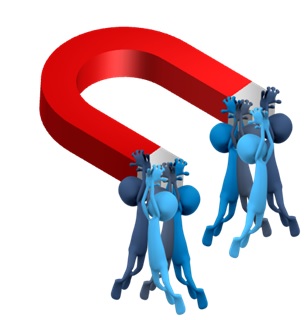 A long time ago I was driving my car and listened to a public radio program where a Norwegian journalist was telling a story about a subject he was about to write an article about, which ended up in a deeper research, and at the end a book. He started to write an article about fashion and ended up in a book about a completely new perspective of our society, “The Attraction Economy”.
A long time ago I was driving my car and listened to a public radio program where a Norwegian journalist was telling a story about a subject he was about to write an article about, which ended up in a deeper research, and at the end a book. He started to write an article about fashion and ended up in a book about a completely new perspective of our society, “The Attraction Economy”.
At that time I used to use the Attraction economy as something that enterprise architects are about to tackle. A business and its IT can’t be driven by individual employee’s attraction to products, methods, vendors, and suppliers.
I still believe that’s right.
But..
In the wake of digital transformation “The Attraction Economy” again landed on my table. After being bombarded with the repeating message that we have to focus on customer experience, I suddenly realize that we still talk about the transformation of people’s behavior and that we still are in the Attraction Economy.
“Tomber” in the headline means that we fall for a thing that attracts us, but also that a company that neglects the perspective of customer attraction eventually will fall.
I took a deeper look at what has happened since then. What I found was a lot of articles. The best one was about a set a set of principles that we should follow in the new economy. They were written by Kevin Roberts in the book “The Lovemarks Effect: Winning in the Consumer Economy,”.
Shortly, to be a winner in the digital economy, you have to be aware of the following:
- Emotion attracts action.
Emotional choices are the ones that matter most because they make change happen. Neurologist Donald Calne tells us reason leads to conclusions and emotion leads to action. - The senses attract the emotions.
Rich fragrances, satisfying tastes, and tactile environments surprise and delight us. Pheromones are irresistible messengers of attraction. - Like attracts like.
Empathy is the energy of the Attraction Economy. Nothing attracts more than an intimate understanding of what matters to us. - Surprise attracts delight.
People love what’s new and different, exciting and stimulating. The mystery keeps the attraction alive - Interactivity attracts commitment.
Whether we click, dial or press, once we commit ourselves we are more likely to do it again, and again - Stories attract memories.
Seventy-seven percent of Americans can name at least two of Snow White’s dwarves. Only 24% of them can name two Supreme Court Justices. The difference? The dwarves have better stories than the Justices. - Entertainment attracts connection.
The skills of the entertainer animate the Attraction Economy. - Music attracts meaning.People have been finding themselves in music for 30,000 years and today it is music my way.
- Communities attract loyalty.
Together they stand. Divided they call each other on their cellphones. - Lovemarks attract inspirational consumers.
They are the people who love to get involved. They are passionate about their Lovemarks, spread their story and innovate for free.
I think these principles summarize a perfect guideline and reminder of what is important when we plan and maintain Customer Experience. Have them in mind!
While studying French, in the middle of summer holiday times in Sweden, I jump into a suitable and for me passionate subject – hotels and their deficiencies.
To me, the hotel business should be highly consumer (guest) driven. I stay at hotels more than 70 nights per year, and have done so for more than 15 years. I haven’t seen much of improvement during that period. The only thing that clearly has changed is the increased focus on member programmes, just like it’s the only thing we think about as guests. Despite of this increased focus, I sometimes have to ask for my benefits when I arrive to a hotel. And why aren’t the programmes valid via all booking channels? Am I suddenly another person and a low priority guest when I book via Hotels.com?
Some hotel booking systems provide the possibility to type in a note/comment, but it never reaches the hotel reception. Others don’t provide the possibility to make a note to the hotel.
There are booking systems where you are logged in as a customer and when performing a booking you still have to type in all information that is stored in your customer profile.
It seems like the preferences for room booking have never changed. Typically you can make choices like “close or far away from the elevator” and “high up or far down in the hotel”. Where are the preferences that I really care about; iron in the room, bath tub, good Wi-Fi coverage and 24h gym? No one has ever asked me about what I really prefer, and obviously the systems can’t store it. When arriving at the hotel the personnel at the reception have poor information about important preferences. For example they often can’t tell if the room has a bath tub without struggling with searching in in paper documents.
This spring I arrived late to a hotel and asked for a late check-out next day. “No problem, fixed” was the answer from the night porter. In the afternoon next day, one hour after I left the hotel, the reception called me and asked why I haven’t checked out. “Your stuff is still in the room!”. I was really confused and first thought that I had forgotten something in the room. After a while I realised that the room cleaner didn’t know about my late check-out and opened my room at 12:00 when I was temporarily out. The cleaner then reported to the reception with a considerable delay, and the reception acted because they didn’t have control. So much stupidity caused by poor procedures and systems.
Something must be fundamentally wrong with the supporting IT systems in the hotel industry sector. It doesn’t fit together. Obvious information about the room, the booking and me as a recurring guest is missing. Solutions for automation and increased quality that are standard in other sectors are totally missing. I now talk about large hotel chains which clearly should afford these investments.
Why don’t the few cleaners have a handheld device where they can see if a guest has checked out from a room and can report back that a room is cleaned and ready for check-in?
One thing has confused me for years. How come that the hotels don’t have a digital register of forgotten items? During my days as a programmer it would have taken me a day to build a solution for that purpose; at the same time it should be basic customer care to handle this issue well. I forget something about every 30th hotel night. During the last 20 years the hotel has called me only once to tell, that a thing was left in the room. And, when calling the reception about a forgotten item they never can answer. They have to switch to the hotels house keeper, which, if answering, during the call has to walk through the complete hotel to look for physical items in different drawers and bookshelves. Worst case is if the house keeper has left for the day. Then no one can answer you until next day, when you are 300 km away.
No doubt about it. The hotel business has a potential. They don’t only have rooms for the guests, they also have many rooms for improvement of guest satisfaction through better IT..
How hard can it be? Or, am I the only one who cares?
P.S. A few weeks ago, I had a positive dialogue. A hotel chain, Elite Hotels, has added a question to the guest satisfaction survey. “If you were the owner of this hotel, what would you fix immediately?”. That kind of question is a good starting point for business development. What do you think I answered? “Better Wi-Fi coverage in room 347 and 405, better parking facilities and more rooms with bath tub.”

 English | EN
English | EN 

Interesting post, Per. Thanks.
Reading the 10 principles and your (very recognizable) experiences with hotels, makes me think of the concept of the “rational consumer”. In a sense that rationality seems to be completely absent in the 10 principles. Rational things like the price, product characteristics and service conditions doesn’t seem to be relevant for customer attraction and therefore not relevant to determine if you will be a winner in the digital economy.
I think that may be true but I think consumers at least want to have the illusion they make rational choices. Curious to know how you look at this aspect.
You have some very good points.
There are a few exceptions among the hotel chains though – I have never had to (re)enter information from my customer profile while booking at Nordic Choice Hotels – But as I recall that is the only hotel chain I have used who are in full(?) control of customer data.